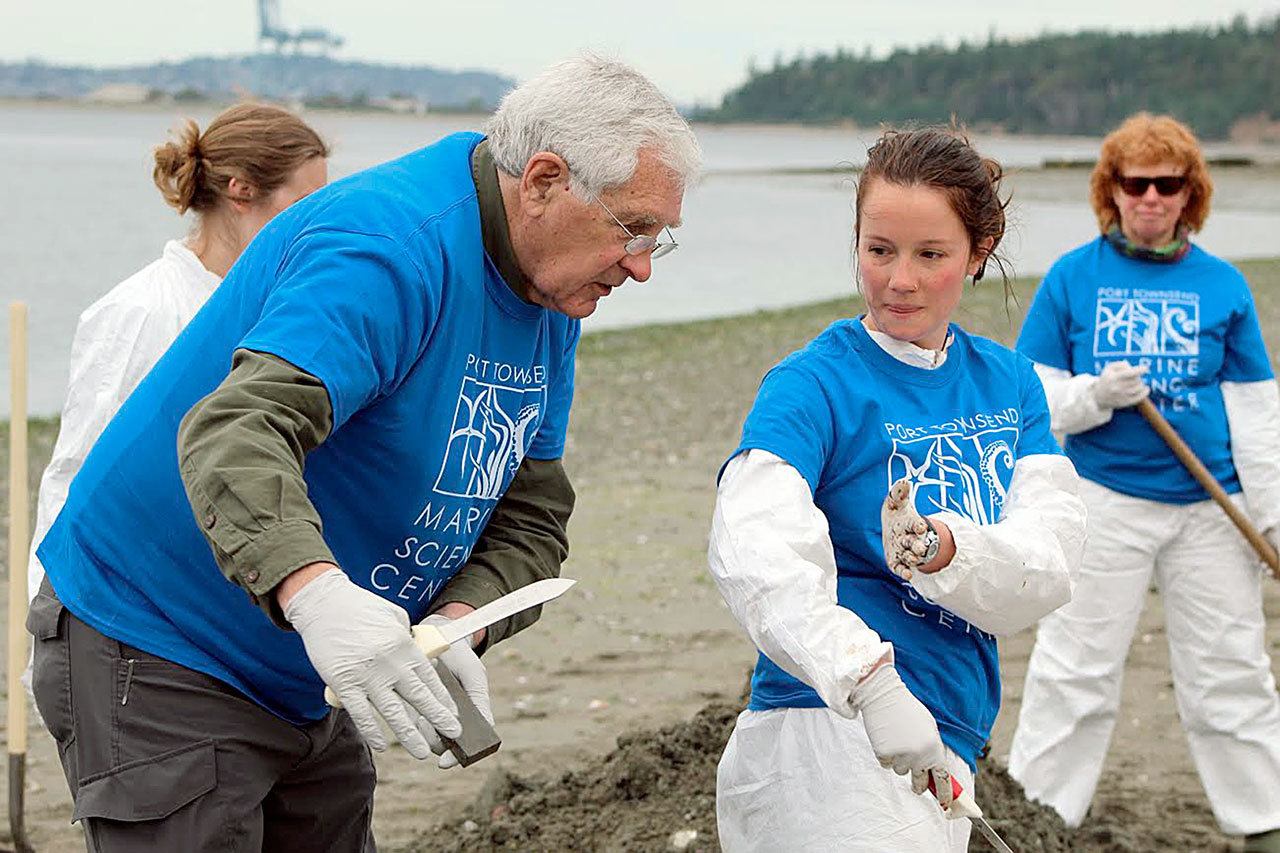Dr. Pete Schroeder, a veterinarian living in Sequim, has received the 12th annual Eleanor Stopps Environmental Leadership Award for his work on the Salish Sea and its aquatic inhabitants over a 50-year career.
Schroeder was given the award at a breakfast hosted by the Port Townsend Marine Science Center on Sept. 27.
“I was just really honored and humbled,” Schroeder said, “but a lot of other people have to be involved to make most of this stuff a success. The best part of it is I’m investing my time and efforts to preserving this environment and what lives in it for my kids, my grandkids and hopefully my great-grandkids.”
The Eleanor Stopps award is an annual award that honors those whose work has helped protect the marine environment of the Salish Sea.
Its namesake, Eleanor Stopps, who testified before the state Legislature and Congress in the 1970s and 1980s, is credited with the establishment of the Protection Island National Wildlife Refuge in 1982. The Port Townsend resident died in 2012 at the age of 92.
Embodies award
Schroeder “just so embodies the spirit of what the Eleanor Stopps award is all about,” said Anne Murphy, former director of the Port Townsend Marine Science Center and a 2006 winner of the Stopps award.
“He’s just a very generous and big-hearted man,” said Murphy, who was among those who nominated Schroeder for the award.
Schroeder, now a veterinarian with the National Marine Mammal Foundation, also has worked with the U.S. Navy and organizations such as the National Marine Fisheries Service’s Science Office of Protected Resources and the National Oceanic and Atmospheric Administration, the marine science center said in a news release.
He probably is best known for his work in helping Springer, an orphaned orca calf that showed up near Seattle in early 2002, according to the marine science center.
With her health failing, it was decided that the best course of action was to capture Springer and take her back to her home waters and her family, a Northern Resident pod.
“He was instrumental in returning this young orca to her pod in Canada,” Murphy said.
Schroeder, who had moved to the Olympic Peninsula to retire in the mid-1990s, became the consulting veterinarian for Springer during her capture, then took the lead in rehabilitating the calf in the Puget Sound, and was the consulting veterinarian for Springer’s release back into Johnstone Strait in British Columbia. Schroeder stayed on to continue monitoring Springer for a few years to ensure that her reintroduction was a success.
This project is the only successful capture, translocation and reintroduction of its kind, according to the marine science center.
More recently, Schroeder was one of the people providing support in the recovery of a gray whale skeleton, which will be used as an educational tool at the Port Townsend Marine Science Center.
He also helped the marine science center research and gain possession of the skeleton of an orca that was stranded and died south of Dungeness Spit 10 years earlier.
“He helped us unearth this whale and then told the story of how it died, which ended up being a fair amount of pollution,” Murphy said.
To better help stranded mammals, Schroeder helped establish the Port Townsend Marine Science Center’s stranding network by submitting a grant to NOAA and providing staff training, according to Murphy.
He also continues to respond to strandings and often performs necropsies to find the cause of death for stranded mammals that end up dying.
“He’s very network-oriented,” Murphy said. “He’s great at introducing people to people that can get things done.”
Schroeder now has turned his attention to the watersheds that empty into the Pacific Northwest, specifically those that are salmon habitats, Murphy said.
“He really sees the big picture,” Murphy said. “Salmon are a major food source for local marine wildlife, so he’s been working with organizations in Clallam County to ensure those are protected as well.”
Schroeder started his career in Solana Beach, Calif., where he began a veterinary practice and monitored the health of captive marine mammals, including those at Sea World.
He then moved to San Diego, where he became an assistant clinical professor at the University of California – San Diego, and the chief of the veterinary medical unit/research at the college’s veterans center.
He continued his research into the health of marine mammals in Hawaii. He also has been a marine mammal health consultant for Ocean Parks, Hong Kong and the governments of the Bahamas, Taiwan, China and the United States.
“What I think is important in life is to do something that helps animals and helps people appreciate animals,” Schroeder said.
“I’ve been a veterinarian for over 50 years and it’s been a lot of helping struggling or endangered species and protecting the environment, especially critical habitats. There’s a lot of satisfaction in that.”
Cydney McFarland is the Jefferson County editor/reporter with the Olympic Peninsula News Group, which is composed of Sound Publishing newspapers Peninsula Daily News, Sequim Gazette and Forks Forum. She can be reached at 360-385-2335, ext. 55052, or at cmcfarland@peninsuladailynews.com.



